Specifications
Absolute maximum ratings are those beyond which damage to the device may occur.
Prolonged operation between the operational specifications and absolute maximum ratings is not intended and may cause permanent device degradation.
Parameter | Min | Max | Units |
Supply voltage | -0.3 | 3.6 | V |
Data input voltage | -0.3 | 3.465 | V |
Control input voltage | -0.3 | 4.0 | V |
Damage Threshold | 3.4 | --- | dBm |
This table shows the environmental specifications for the product.
Parameter | Min | Max | Units |
Storage temperature | -40 | 85 | °C |
This section shows the range of values for normal operation. The host board power supply filtering should be designed as recommended in the SFF Committee Spec.
Parameter | Min | Typ | Max | Units |
Supply voltage (Vcc) | 3.135 | 3.3 | 3.465 | V |
Power consumption (each end, retiming on all lanes) | --- | 4.35 | 4.55 | W |
Supply noise tolerance (10Hz – 10MHz) | 66 | --- | --- | mVpp |
Operating case temperature | 0 | --- | 70 1 | °C |
Operating relative humidity | 5 | --- | 85 | % |
Internal temperature readout through DDMI of up to 75°C is allowed.
Parameter (per lane) | Min | Typ | Max | Units |
Signaling rate | -100 ppm | 53.125 | +100 ppm | GBd |
Differential data input swing at TP1a | TBD | --- | 900 | mVpp |
Differential data output swing at TP4 | --- | --- | 900 | mVpp |
Near-end ESMW | 0.265 | --- | --- | UI |
Near-end output eye height | 70 | --- | --- | mVpp |
Output transition time, 20% to 80% | 9.5 | --- | --- | ps |
Notes:
Multiple clock domains are supported only on line-side Rx. Host side Rx supports a single clock domain only.
QSFP Tx CDR lock can only occur if Tx lane 4 is transmitting data.
For configurations tested with the AOCs please refer to the system level product (SLP) qualification report.
The DDM functions are implemented according to SFF-8636 for reading the following key parameters with associated warning and alarm thresholds:
Temperature with warning/alarm
Supply voltage with warning/alarm
Laser bias current with warning/alarm
Transmitted optical power with warning/alarm
Received optical power with warning/alarm
The AOC supports rate select, which is controlled by writing to registers 0x57-0x58. Two bits are assigned for each receiver lane in byte 0x57 (87dec, Rxn_Rate_Select) and two bits for each transmitter lane in byte 0x58 (88dec, Txn_Rate_Select) to specify up to four bitrates, as defined in SFF-8636 Rev 2.9.2 Table 6-5 XN_RATE_SELECT ENCODINGS. All four lanes are required to have the same rate select value.
The below table specifies the rate for each rate select setting.
Rate Select Encodings
Rate Select Value | Operating Rate (GBd) |
10 | 25.78125 NRZ |
11 | 26.56250 PAM4 |
Parameter | Value | Units | |
Diameter | 3 +/-0.2 | mm | |
Minimum bend radius | 30 | mm | |
Length tolerance | length < 5 m | +300 /-0 | mm |
5 m ≤ length < 50 m | +500 / -0 | ||
50 m ≤ length | +1000 /-0 | ||
Cable color | Aqua | --- | |
Mechanical Dimensions
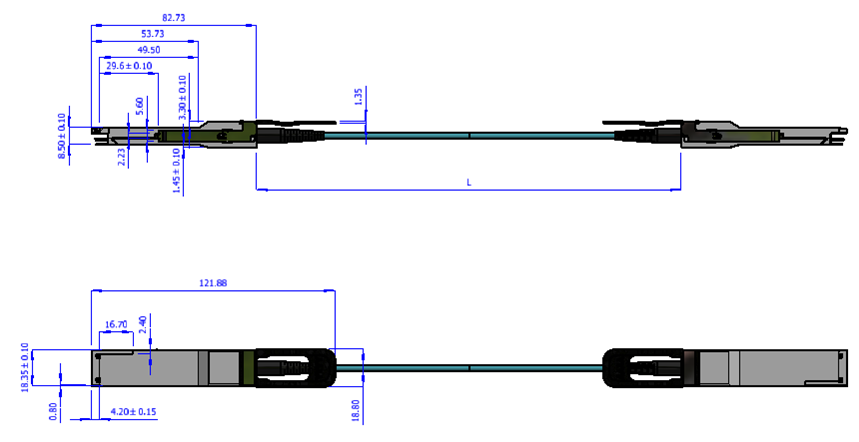
Cable Length Definition

The following label is applied on the transceiver's backshell:
Backshell Label
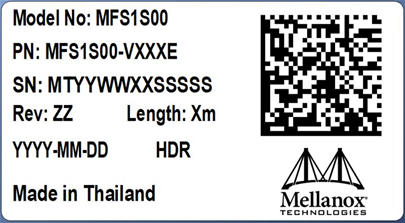
(sample illustration)
Backshell Label Legend
Symbol | Meaning | Notes | |
PN - Part Number | |||
xxx | Length | Meter | |
SN – Serial Number | |||
MT | Manufacturer name | 2 characters, e.g. MT | |
YY | Year of manufacturing | 2 digits | |
WW | Week of manufacturing | 2 digits | |
XX | Manufacturer site | 2 characters | |
SSSSS | Serial number | 5 digits for serial number, starting from 00001. Reset at start of week to 00001. | |
Miscellaneous | |||
ZZ | HW and SW revision | 2 alpha-numeric characters | |
Xm | Cable length | Meter | |
YYYY | Year of manufacturing | 4 digits | |
MM | Month of manufacturing | 2 digits | |
DD | Day of manufacturing | 2 digits | |
COO | Country of origin | E.g. China or Thailand | |
Quick response code | Serial number | ||
The following label is applied on the cable’s jacket:
Fiber Cable Jacket Labels (New/Current)
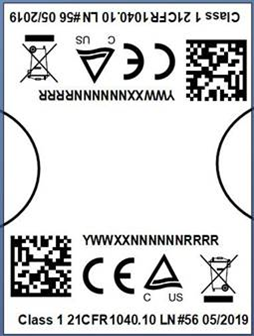
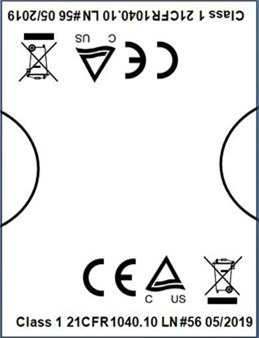
(sample illustration)
Fiber Cable Jacket Labels (Old)
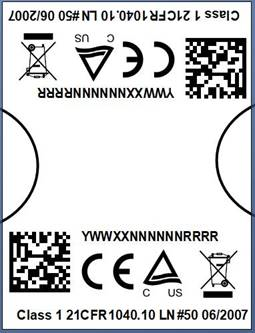
(sample illustration)
Note: The serial number and barcode are for NVIDIA internal use only. Different layouts of this label apply to different production series. It has no effect on the cable's performance nor function
The laser module is classified as class I according to IEC 60825-1, IEC 60825-2 and 21 CFR 1040 (CDRH).
Safety: CB, cTUVus, CE
EMC: CE, FCC, ICES, RCM, VCCI
Ask your NVIDIA FAE for a zip file of the certifications for this product.
This equipment has been tested and found to comply with the limits for a Class A digital device, pursuant to part 15 of the FCC Rules. These limits are designed to provide reasonable protection against harmful interference when the equipment is operated in a commercial environment. This equipment generates, uses, and can radiate radio frequency energy and, if not installed and used in accordance with the instruction manual, may cause harmful interference to radio communications. Operation of this equipment in a residential area is likely to cause harmful interference in which case the user will be required to correct the interference at his own expense.

